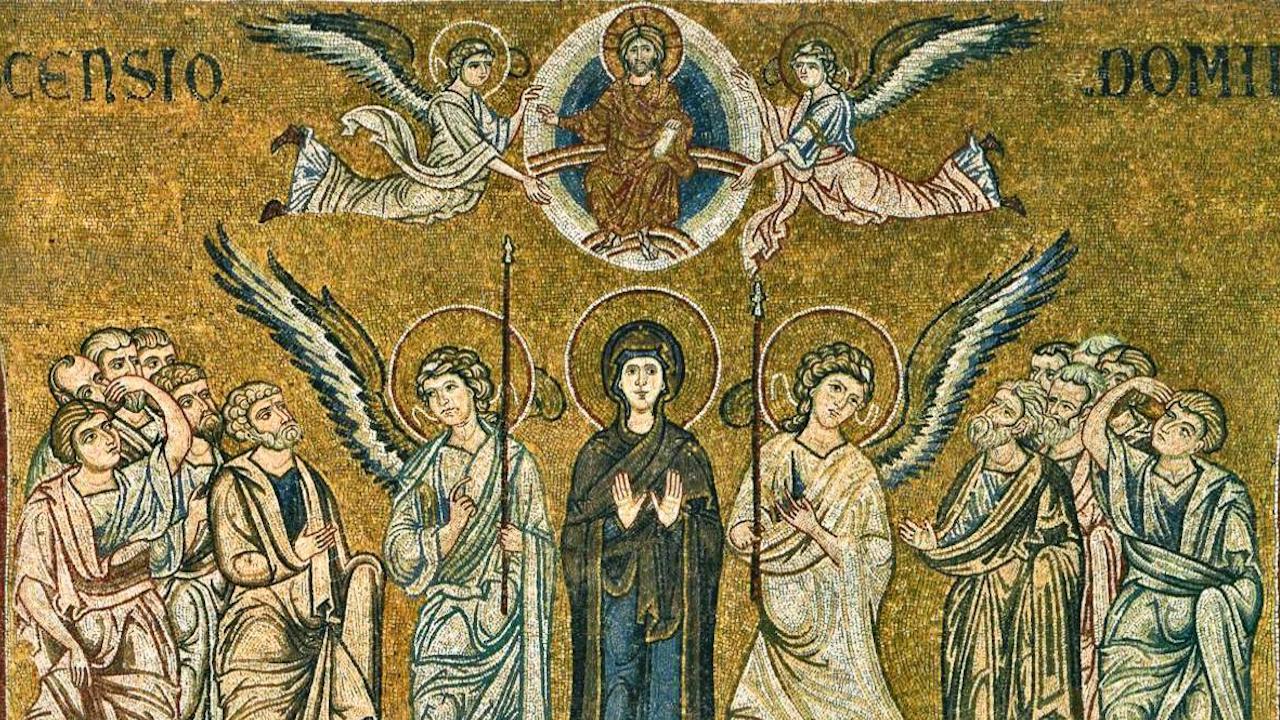TODAY THE
Lord not only stood with His disciples after His resurrection, but was also parted from them and was taken up into heaven as they watched (Acts 1.9-11), ascended and entered into the true Holy of Holies and sat down on the right hand of the Father, far above all principality and power and every name and honor that is known and named, either in this world, or in that which is to come (cf. Eph. 1.20-21). There were many resurrections before Christ’s resurrection, and similarly, there were many ascensions before His ascension. The Spirit lifted up Jeremiah the prophet, and an angel took up Habakkuk (Bel & Dr. 33-39 LXX). In particular it is written that Elijah went up with a chariot of fire (2 Kgs. 2.11). But even he did not go beyond the realms of earth, and the ascension of each of those mentioned was just a sort of movement lifting them up from the ground without taking them out of the area surrounding the earth. Similarly, the others who were resurrected all died and returned to the earth. By contrast, Christ has risen and death no longer has dominion over Him (cf. Rom. 6.9), and now He has ascended and sat down on high, every height is below Him and bears witness that He is God over all (Rom. 9.5).
The Master’s body is the visible mountain of which Isaiah speaks, the Lord’s house above the tops of all the mountains of reason (cf. Is. 2.2 LXX). Neither an angel nor a man, but the incarnate Lord Himself came and saved us, being made like us for our sake while remaining unchanged as God. In the same way as He came down, without changing place but condescending to us, so He returns once more, without moving as God, but enthroning on high our human nature which He had assumed. It was truly right that the first begotten nature from the dead (Rev. 1.5) should be presented there to God, as firstfruits from the first crop offered for the whole race of men.
Although many resurrections and ascensions have taken place, we celebrate none of them as we do the Lord’s resurrection and ascension, because we neither have nor ever shall have any share in those others. All we gained from them was to be led towards faith in our Savior’s resurrection and ascension, in which we all share now and in the future. His resurrection and ascension are the resurrection and ascension of our human nature; and not just of our human nature, but of everyone who believes in Christ and shows his faith in works (cf. Jas. 2.18). Christ was unbegotten and uncreated according to His divinity, and it was for our sake that He became man. He lived as He did because of us, teaching us the path that leads back to true life. Everything he suffered in the flesh He suffered for us to heal our passions. On account of our sins He was led to death, and for us He rose and ascended, preparing our own resurrection and ascension for unending eternity. For all the heirs of everlasting life follow as far as possible the pattern of His saving work on earth.
We start this imitation of Christ with holy baptism, which symbolizes the Lord’s burial and resurrection. Virtuous living and conduct in accord with the gospel are its intermediate stage, and its perfection is victory through spiritual struggles against the passions, which procures painless, indestructible, heavenly life. As the apostle tells us: “If ye live in the flesh, ye shall die; but if ye through the Spirit do mortify the deeds of the body, ye shall live” (cf. Rom. 8.13). Those who live according to Christ imitate what He did in the flesh. Just as He died physically, so in time everyone dies, but we shall also rise again in the flesh as He did, glorified and immortal, not now but in due course, when we shall also ascend, as Paul says: for “we shall be caught up,” he says, “in the clouds, to meet the Lord in the air; and so shall we ever be with the Lord” (1 Thess. 4.17).
~St Gregory Palamas, On the Ascension, Homily 21










